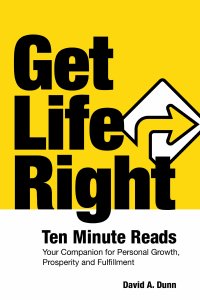**Please note, I was provided a free copy of this book in exchange for a review. Fortunately, giving it a good review was no problem.**
As someone who is often battling the feeling of being stuck in neutral and the Blerch, I found Get Life Right by David A. Dunn to be a pretty delightful little read.
It’s largely a motivational book with a ton of actionable advice to get your priorities in order and your dreams conquered. It’s also all broken down into little ten minute reading chunks, each with an actionable piece of advice at the end.
I don’t know about you, but I love it when there are concrete steps to take.
Get Life Right covers a ton of topics – from our favorites here at brokeGIRrich like putting your finances in order and succeeding in a field your passionate about to how to improve your relationships and create a strong family, David has advice on pretty much everything.
Considering the fact that so much of life is interconnected, it’s not surprising.
I really enjoyed the section on gaining motivation using visualization that rolled right into setting personal goals. Get Life Right encourages you to set out personal goals, long term goals and intermediate goals.
The emphasis on personal goals was interesting to me because I think it’s often overlooked. Personal goals were personality aspects you wanted to develop or refine such as “learn to think better,” “be reliable,” and “be generous.” The funny thing is that those are hard skills to develop, but they all are developable. You just have to continually work on it.
By consciously acknowledging them and adding them to your visualization, you’re really creating the toolbox to build your long term and intermediate goals from. For example, learning to be more reliable is going to improve your work performance and get you that career boost or raise you hoped for.
Another lesson from the book that stuck with me was “all winners start as beginners.” Probably because I have no patience what-so-ever and expect to be awesome at things immediately… and if I’m not, I usually decide that whatever I was working on just isn’t worth my time.
Not the best approach if I want to get life right, amiright?
Dunn has this terrific example that made me laugh and really made me rethink how we consider progress:
While a baby is learning to walk, her diaper hangs down; she stumbles around, pulls objects off the table, hits her head on the furniture, and spills everything she can touch. All her missteps are viewed by her parents as progress, not failure. (52)
That is a pretty accurate description of a (cute) hot mess right there and he’s right. It’s all 100% progress and no one would see it as anything but that.
There was also a section on acting “as if” you already had something or could already do a skill, which made me laugh, because it feels like the story of a stage manager’s life. It reminded me of when I was interviewing to work for the cruise line, which was a MASSIVE jump in skill level from where I’d stage managed previously. I just convinced them I had all the skills necessary to nail this job.
I vividly remember walking onto the stage for the first time, on my first ship, and thinking “oh my gosh, I’m going to kill the performers. I have no idea what I’m doing with this automation stuff.”

Did you know there were like 42 points of automation on this ship? That was 42 different ways to possibly kill someone by calling a cue at the wrong time.
Potentially maiming and killing people is a heck of a motivator. And I can assure you that not a single technician or performer reporting to me ever knew I had that thought. I literally pushed through it by thinking “clearly, it can be done – so step it up and learn how right now” and from there on out, I acted “as if” I knew what I was doing.
Just like I acted “as if” I knew what I was doing during my first ever show stop. So everyone stayed calm and followed my lead.
Or “as if” I knew what to do when your performer starts complaining of heart pain.
Or “as if” I knew how to pass an extensive safety audit with Lloyds of London that could’ve cost the company thousands in insurance premiums if I messed up.
To be clear, I’m not saying that any of these things came up with no training at all. I’d read a stage management book on what to do about show stops. I took the Red Cross training classes for CPR. I’d studied all our safety manuals and knew all the procedures to talk to the insurance auditors.
Despite that, it wouldn’t’ve been hard for me to say I had no idea what I was doing, because to be honest, I didn’t have much confidence I did the first time I did those things. Instead I plunged in, acted “as if” I did and got through those moments.
And then I knew I did know.
Another funny thing about this book is that I wasn’t super interested in the relationships section, but actually found it really cathartic and helpful to read. My job is really stressful mostly because of my boss and reading through how to interact with difficult personality types was really something I needed a refresher on.
Get Life Right is definitely a great motivational read for anyone else struggling through a rough time (am I the only one counting down to the end of 2014 and ready to put this one behind me?).





This sounds like an awesome motivational book! Truthfully I haven’t read many motivational books because I feel like they all say the same thing, I tend to be inspired by reading about someone else’s success or journey instead since I am usually motivated by competition or other people’s work.
Shannon @ Financially Blonde recently posted…Music Mondays – Anyway You Want It
I do like real life success stories too. I think the thing that really stood out to me about this book was all the actionable worksheets it had to fill out.
I love the baby analogy. Missteps are progress- if you learn from them.
Stefanie @ The Broke and Beautiful Life recently posted…How To Make Gift Cards Personal
Adding to my list to read. I’ll need to check out the relationship section, always running across a crossed eyed person or two its seems at work these days.
Brian @ Debt Discipline recently posted…Technology Review: LoopPay
I love reading books by people who have lost of a ton of weight. There are so many out there and my book shelf is filled with them.